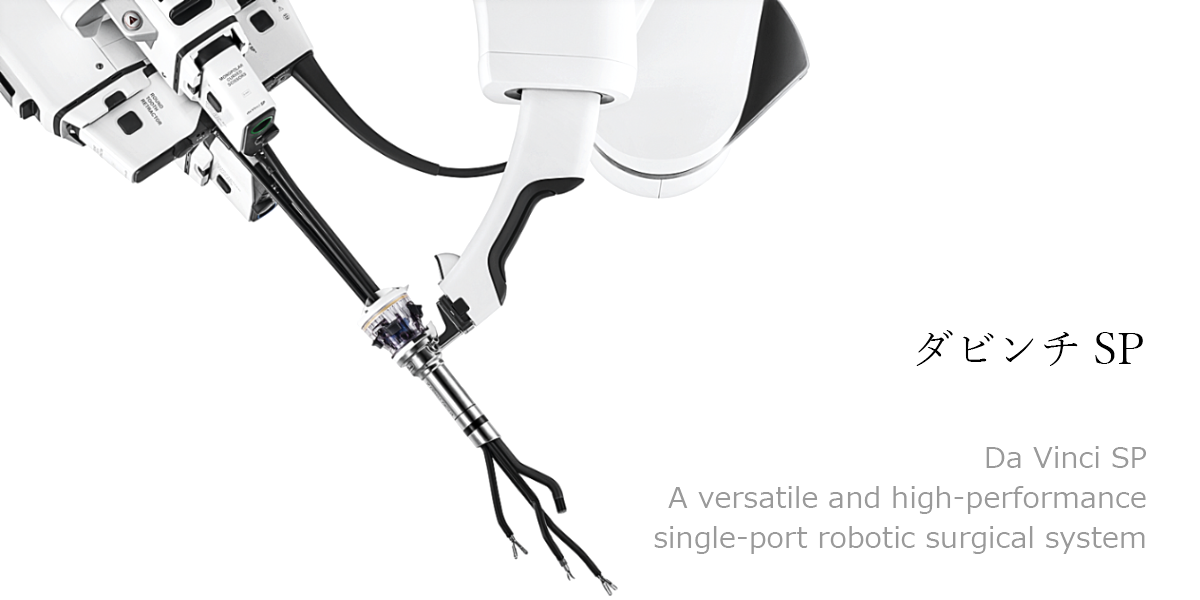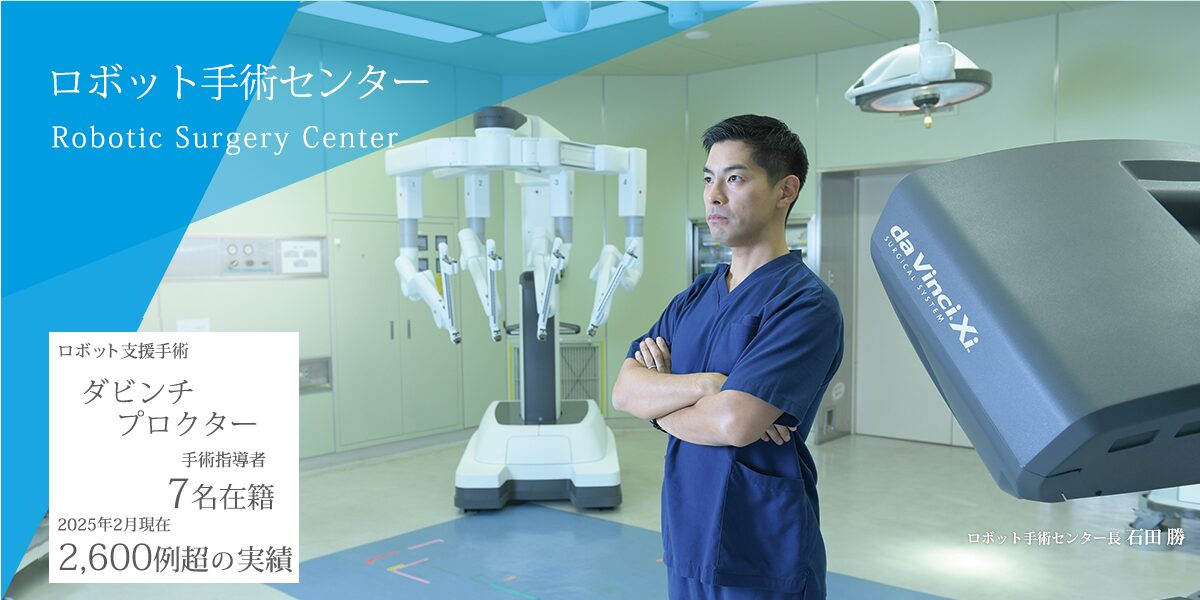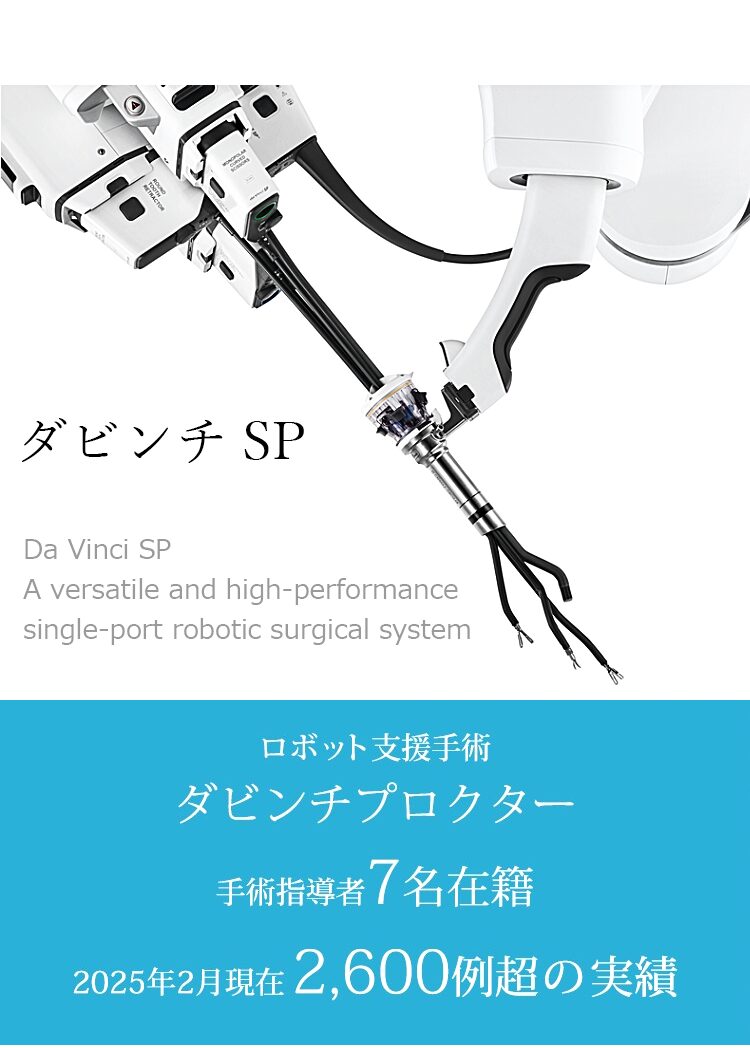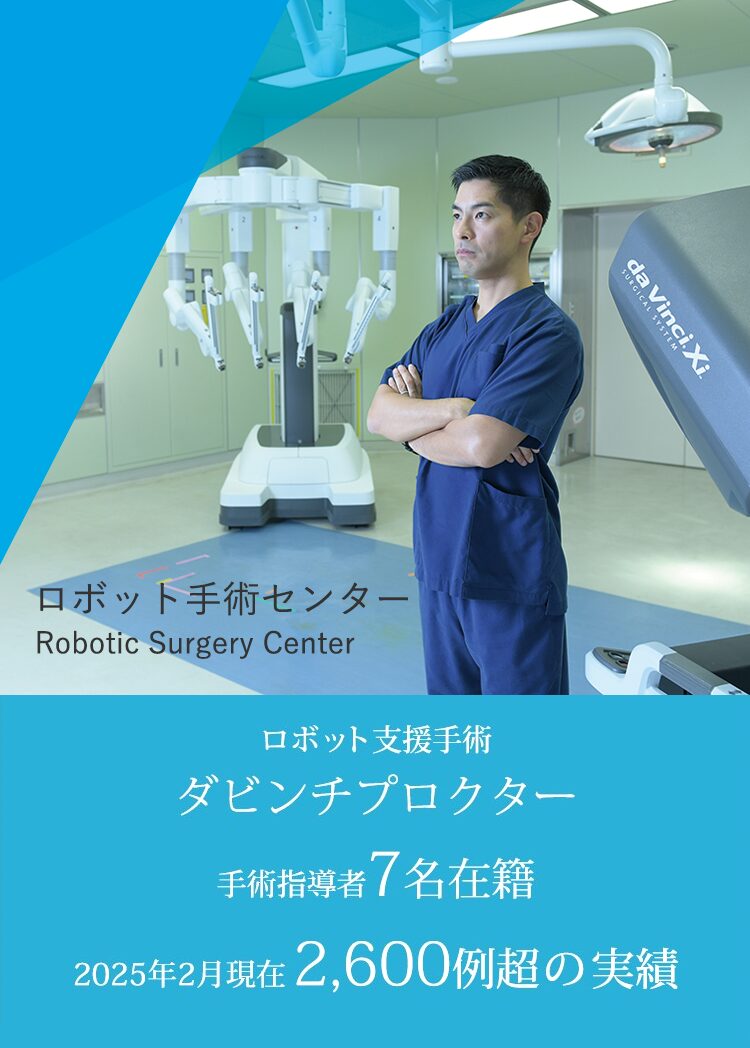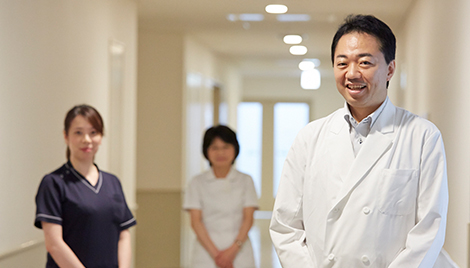当院では横浜市初となるロボット支援手術を2012年に開始。
以来、精密な手術操作が可能という特徴を活かし、適応手術を順次拡大してまいりました。
現在では国内有数の2000例以上もの手術経験を有し、
当院が担う高度専門医療の一つとして着実に実績を上げております。
今後も地域の皆さまが安心して高度な医療を受けられるよう、治療の選択肢のひとつとして
「ロボット支援手術」を提供してまいりますので、どうぞお気軽にご相談下さい。
ロボット手術センター長 石田 勝
トピックス
【プレスリリース】神奈川県初!済生会横浜市東部病院 胃がん手術に「ダビンチSP」を導入
2025年01月07日:
泌尿器科 石田勝がロボット外科学会のRobo-Doc Pilot 国際A級を取得しました。
2024年09月25日:
最新の手術支援ロボット「ダビンチSP」を導入します。
2024年01月09日:
手術支援ロボット「ダビンチ」による手術件数が累計2,000件を突破しました。
2023年08月29日:
呼吸器外科のロボット支援手術実績が200例に到達しました。
2023年04月04日:
【メディア情報】時事メディカル「広がるロボット支援手術 ~患者の負担減、医師にも恩恵~」
2022年12月13日:
【メディア情報】済生会HP 病気解説特集「ロボット支援手術の現場拝見! ~最新機器「ダビンチXi」の特徴と強みを探る~」
2022年09月22日:
2022年9月より「ロボット支援下肝切除術」を開始しました。
2022年08月23日:
呼吸器外科のロボット支援手術実績が100例に到達しました。
2021年12月01日:
2021年12月より神奈川県内で初めて「ロボット支援下膵切除術」の保険診療を開始しました。
2021年09月13日:
2021年8月より神奈川県内で初めて「ロボット支援下膵切除術」を開始しました
2021年07月01日:
ダビンチ2台目導入のお知らせ
2021年02月01日:
肺がんに対するロボット支援手術の保険診療を開始します
ロボット手術センターは、ロボット手術を一元管理することで、患者さんが手術を待つ期間をできる限り短くしています。
ロボット手術をご希望の方は、ロボット手術担当医による専用外来をご予約ください(詳しくはこちらをご覧ください)。
ロボット手術外来初診の方は、WEB予約をご利用頂けます。
【手技公開 デモンストレーション編】
最新の設備を揃え、診断から治療、手術、
術後のフォローアップまで患者さんの負担を軽減します。
【ロボット手術の全貌を解説編】
直接人の手による腹腔鏡手術よりも精緻な操作が可能なダビンチ。その全貌をダビンチXiを用いて解説しています。
【ロボット手術センター編】
保険適用が広がるにあたり、科をまたいでロボット手術を
提供できるようセンター化。実績の多さが強みです。

-


当院では2024年10月より最新の手術支援ロボットダビンチSPを導入。神奈川県内では初、全国では9施設目となります。2012年に横浜市で初めてダビンチSを取り入れ、2016年にダビンチXiにバージョンアップ。以来、国内有数の2,000 症例を重ねて参りました。既設のダビンチXi2台と併せ、ダビンチSP1台の計3台体制で、患者さんをお待たせすることなく、短い待機期間で手術が出来るようになります。
手術支援ロボットは、これまでの腹腔鏡下手術よりも緻密で複雑な手術操作が可能で、より難しい手術にも対応することができます。また、腹腔鏡と同じ内視鏡手術のため、患者さんの身体への負担が軽い低侵襲な治療です。手術支援ロボットによる手術は、術後の早期回復に大きく貢献します。 -


ダビンチは、手術機器を動かすロボット本体、術者がロボットを操作するためのコンソール、術野を映像化するビデオシステムから構成されています。術者はコンソールに座り遠隔操作でロボットを動かして手術をします。
ダビンチXiはマルチポートシステムと呼ばれ、複数の手術創が必要なのに対し、今回導入されたダビンチSPはシングルポートシステムで、1本のアームに取り付けられたカメラと3本の鉗子が、アクセスポートを経て体腔内に入り手術を行うことができます。最小で1つの切開創で手術を行うことも可能となり、創部の痛みなど患者さんの負担を軽減することが期待されます。SPとXiいずれにも利点があり、症例によって使い分けます。 -


「傷口が小さい」「出血量が少ない」「術後の痛みが少ない」「回復が早く早期退院が可能」「がんの取り残しが少ない」と言った手術全般に共通するメリットのほか、例えば前立腺がんの手術では「術後尿失禁が少ない」「勃起機能維持率が高い」などが挙げられます。

ダビンチSPの対象疾患
泌尿器科
●前立腺がん ●腎細胞がん(部分切除・全摘)
●腎盂尿管がん ●副腎腫瘍
●腎盂尿管移行部狭窄症
婦人科
●良性子宮疾患 ●子宮体がん
外科
●直腸がん ●大腸がん
●肝臓がん
呼吸器外科
●肺がん ●縦隔腫瘍
2025年5月末時点
症例数合計 2,785件
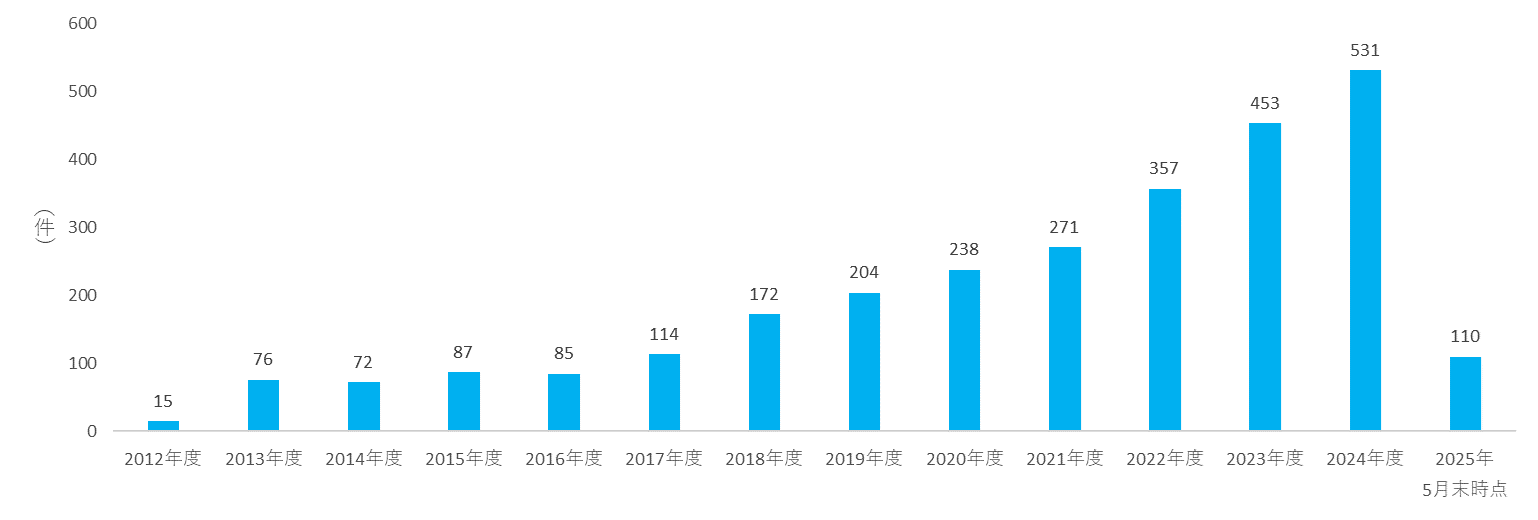
保険適用
| 診療科 | 対象疾患 | 術式 | 機種 | 症例数 | 開始年 |
| 泌尿器科 | 前立腺がん | 前立腺全摘 | Xi | 1106 | 2012 |
| SP | 43 | 2024 | |||
| 腎細胞がん | 腎部分切除術 | Xi | 239 | 2014 | |
| SP | 8 | 2024 | |||
| 腎摘除術 | Xi | 22 | 2022 | ||
| SP | 3 | 2025 | |||
| 膀胱がん | 膀胱全摘 | Xi | 100 | 2017 | |
| 腎孟尿管移行部狭窄症 | 腎孟形成術 | Xi | 40 | 2018 | |
| SP | 4 | 2025 | |||
| 腎孟・尿管がん | 腎尿管全摘術 | Xi | 9 | 2023 | |
| SP | 1 | 2025 | |||
| 副腎腫瘍 | 副腎摘出術 | Xi | 16 | 2022 | |
| SP | 5 | 2024 | |||
| 副腎摘出術(褐色細胞腫) | Xi | 1 | 2024 | ||
| 外科 | 胃がん | 幽門側胃切除 胃全摘 |
Xi | 169 | 2013 |
| SP | 1 | 2025 | |||
| 大腸がん(直腸) | 直腸切除・切断術 | Xi | 99 | 2020 | |
| SP | 7 | 2024 | |||
| 大腸がん(結腸) | 結腸切除術 | Xi | 35 | 2023 | |
| SP | 10 | 2025 | |||
| 食道がん | 食道切除術 | Xi | 9 | 2025 | |
| 膵体尾部腫瘍 | 膵体尾部腫瘍切除術 | Xi | 35 | 2022 | |
| 膵頭部腫瘍 | 膵頭十二指腸切除術 | Xi | 23 | 2022 | |
| 肝臓がん | 肝切除術 | Xi | 47 | 2023 | |
| SP | 4 | 2025 | |||
| 膵・胆管合流異常症 | 総胆管拡張症手術 | Xi | 1 | 2025 | |
| 産婦人科 | 良性子宮疾患 | 子宮全摘 | Xi | 211 | 2013 |
| SP | 31 | 2024 | |||
| 子宮体がん | 準広汎子宮全摘 (骨盤リンパ節郭清術) |
Xi | 85 | 2013 | |
| SP | 12 | 2024 | |||
| 産婦人科 泌尿器科 |
骨盤臓器脱 | 仙骨膣固定術 | Xi | 52 | 2018 |
| 呼吸器外科 | 縦隔腫瘍 | 縦隔腫瘍手術 | Xi | 72 | 2020 |
| SP | 2 | 2025 | |||
| 肺がん | 肺悪性腫瘍手術 | Xi | 268 | 2020 | |
| SP | 4 | 2025 |
保険適用外
| 診療科 | 対象疾患 | 術式 | 症例数 | 開始年 |
| 産婦人科 | 子宮頸がん※ | 広汎子宮全摘術 | 11 | 2013 |
※子宮頸がんの手術は現在実施しておりません
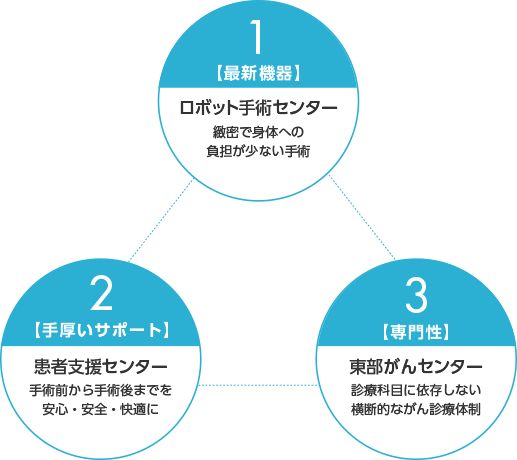
最新機器の手術支援ロボットである『ダビンチ』を活用する「ロボット手術センター」に、現在いる認定医は12名(2024年9月現在)。がんと診断されたら(一部のがんを除く)、「東部がんセンター」でその時点で考えられる最も効果がある最良の治療法を、診療科目に限定することなく検討し、「患者支援センター」と連携しながら、術前・術中・術後を手厚くサポート。高度急性期病院として最先端の医療を充実させるため、これら3センターのタイアップにより高度医療を推進していきます。そしてこの度、保険適用の範囲が拡大したことにより、多くの患者さんにロボット支援手術を提供できるようになりました。
2018年4月からは、胃がん、膀胱がんの手術も厚生労働省が定めた施設基準を満たしているため、保険適用での治療を受けることができます。
-
- 前立腺がん:前立腺全摘
- 腎細胞がん:腎部分切除術
- 腎細胞がん:腎摘除術
- 腎盂・尿管がん:腎尿管全摘術
- 膀胱がん:膀胱全摘
- 腎盂尿管移行部狭窄症:腎盂形成術
- 胃がん:切除・噴門側切除・全摘
- 大腸がん:直腸切除・切断術
- 大腸がん:結腸悪性腫瘍切除術
- 膵・胆管合流異常症:総胆管拡張症手術
- 肝臓がん:肝切除術
- 膵体尾部腫瘍:膵体尾部腫瘍切除術
- 膵頭部腫瘍:膵頭十二指腸切除術
- 良性子宮疾患:子宮全摘
- 子宮体がん:準広汎子宮全摘
(骨盤リンパ節郭清術) - 骨盤臓器脱:仙骨膣固定術
- 縦隔腫瘍:縦隔腫瘍手術
- 肺がん:肺悪性腫瘍手術
- 副腎腫瘍:副腎摘出術
- 褐色細胞腫:副腎摘出術(髄質腫瘍)
2012年にダビンチによる手術を開始以来、有効性が高いと思われる手術は、当院倫理委員会の承認を得て、保険適用前にいち早く実施してきました。今後も安全性に配慮しながら、保険適用外の手術も実施していきます。
(施設基準を満たすと保険適用になります)
前立腺がんの手術が2012年に国内で保険適用となって以来、手術支援ロボット「ダビンチ」による手術は増加しています。2018年4月、保険適用の手術が拡大し、当院では「前立腺がん」「腎細胞がん」「胃がん」「膀胱がん」が厚生労働省の定める施設基準を満たし、健康保険での治療を受けることが可能になりました。
 「ロボット手術センター」今後の役割
「ロボット手術センター」今後の役割
診療報酬改定での保険適用拡大に合わせて、より多くの手術を保険適用で受けられるよう、準備をすすめていきます。国内外の新しく有効な治療・手術の情報を集め、より良い医療を提供していきます。また、優秀な医師を新しい術者として育成する院内の教育システムを確立し、次世代の医療に貢献します。
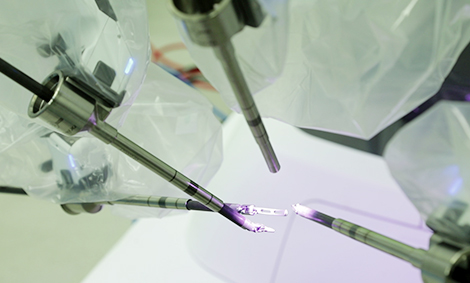
| 泌尿器科 | 婦人科 | 外科 | 呼吸器外科 |
|---|---|---|---|
| 石田 勝・案納 忠譜・ 三條丹星・荒井将至 |
吉田 卓功・田口 圭祐 | 江川 智久・西山 亮・ 山田 暢・森本 洋輔 |
井上 芳正・村岡祐二 |
| 泌尿器科 |
|---|
| 石田 勝・案納 忠譜・三條丹星・荒井将至 |
| 婦人科 |
| 吉田 卓功・田口 圭祐 |
| 外科 |
| 江川 智久・西山 亮・山田 暢・森本 洋輔 |
| 呼吸器外科 |
| 井上 芳正 |

石田 勝(いしだ まさる)
慶應義塾大2002年卒
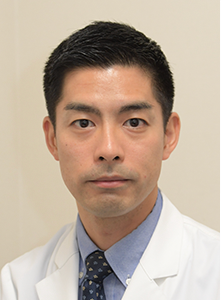
| 専門分野 | 泌尿器科 |
|---|---|
| 特に専門としている分野 | 尿路性器癌の診断・治療、ロボット支援手術、泌尿器科腹腔鏡手術、前立腺癌治療 |
| 学会専門医・認定医 | 日本泌尿器科会認定 指導医 日本がん治療認定医機構 がん治療認定医・指導責任者 日本泌尿器科学会・日本泌尿器内視鏡学会 泌尿器ロボット支援手術教育プログラム修了(da Vinci S・Si・X・Xi・SP) 日本泌尿器科学会・日本泌尿器内視鏡学会認定 ロボット支援手術プロクター (手術指導医) 膀胱・前立腺(ダビンチ・ダビンチSP)、副腎・腎 (尿管)(ダビンチ・ダビンチSP) 日本ロボット外科学会認定 Robo-Doc Pilot(国際A級) 日本内視鏡外科学会認定 技術認定医 (泌尿器腹腔鏡) 日本泌尿器内視鏡学会認定 泌尿器腹腔鏡技術認定医 日本泌尿器内視鏡・ロボティクス学会 代議員 臨床研修指導医(厚生労働省開催指針準拠 指導医講習会修了) 厚生労働省開催指針準拠 緩和ケア研修会修了 2nd degree Master in Surgical Andrology, University of Torino 博士 (医学) 日本医師会認定 産業医 慶應義塾大学医学部講師 (非常勤) |
案納 忠譜(あんのう ただつぐ)
慶應義塾大2013年卒
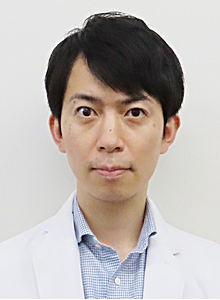
| 専門分野 | 泌尿器科 |
|---|---|
| 特に専門としている分野 | 尿路性器癌の診断・治療、前立腺肥大症に対する低侵襲手術治療、ロボット支援手術 |
| 学会専門医・認定医 | 日本専門医機構認定 泌尿器科専門医 日本泌尿器科学会認定 指導医 日本泌尿器科学会・日本泌尿器内視鏡学会 泌尿器ロボット支援手術教育プログラム修了 (da Vinci Xi・SP) 日本泌尿器科学会・日本泌尿器内視鏡学会認定 ロボット支援手術プロクター (手術指導医) 膀胱・前立腺(ダビンチ) 日本がん治療認定医機構がん治療認定医 臨床研修指導医(厚生労働省開催指針準拠 指導医講習会修了) 博士 (医学) 厚生労働省開催指針準拠 緩和ケア研修会修了 |
三條 丹星(さんじょう たんせい)
三重大2014年卒
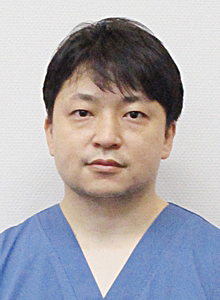
| 専門分野 | 泌尿器科 |
|---|---|
| 特に専門としている分野 | 前立腺肥大症、腎細胞がん |
| 学会専門医・認定医 | 日本専門医機構認定 泌尿器科専門医 日本泌尿器科学会・日本泌尿器内視鏡学会 泌尿器ロボット支援手術教育プログラム修了 (da Vinci Xi・SP) 臨床研修指導医(厚生労働省開催指針準拠 指導医講習会修了) 日本救急医学会 ICLSプロバイダー 厚生労働省開催指針準拠 緩和ケア研修会修了 |
荒井 将至(あらい まさし)
帝京大2015年卒
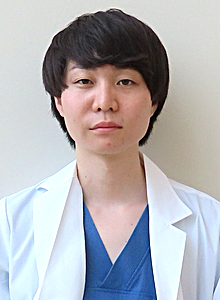
| 専門分野 | 泌尿器科 |
|---|---|
| 特に専門としている分野 | 尿路性器癌の診断・治療 |
| 学会専門医・認定医 | 日本専門医機構認定 泌尿器科専門医 日本泌尿器科学会・日本泌尿器内視鏡学会泌尿器ロボット支援手術教育プログラム修了 (da Vinci Xi・SP) 日本泌尿器科学会・日本泌尿器内視鏡学会認定 ロボット支援手術プロクター (手術指導医) 膀胱・前立腺(ダビンチ) 日本がん治療認定医機構がん治療認定医 厚生労働省開催指針準拠 緩和ケア研修会修了 |

吉田 卓功(よしだ たかのり)
川崎医科大2009年卒
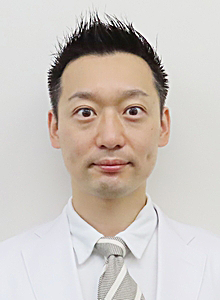
| 専門分野 | 周産期、腹腔鏡下手術、悪性腫瘍、手術一般 |
|---|---|
| 学会専門医・認定医 | 日本産科婦人科学会産婦人科専門医・指導医 日本産科婦人科内視鏡学会技術認定医 日本内視鏡外科学会技術認定医 日本婦人科腫瘍学会婦人科腫瘍専門医 日本がん治療認定医機構認定医 日本女性医学学会女性ヘルスケア専門医 日本ロボット外科学会ロボット支援手術認定医 日本ロボット外科学会国内B 級ライセンス 日本婦人科ロボット手術学会 ロボット支援手術プロクター(良・悪性) 日本専門医機構認定婦人科専門医 厚生労働省開催指針準拠 緩和ケア研修会修了 |
田口 圭祐(たぐち けいすけ)
岩手医科大2012年卒
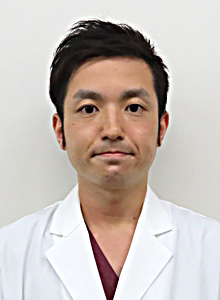
| 専門分野 | 周産期、婦人科腫瘍、腹腔鏡下手術、ロボット支援手術 |
|---|---|
| 学会専門医・認定医 | 日本産科婦人科学会産婦人科専門医、指導医 日本産科婦人科内視鏡学会技術認定医(腹腔鏡、ロボット) 日本内視鏡外科学会技術認定医 日本婦人科腫瘍学会婦人科腫瘍専門医 日本女性医学学会女性ヘルスケア専門医 日本がん治療認定医機構がん治療認定医 ロボット支援手術認定医(da Vinci Xi) 日本ロボット外科学会専門医(国内B級) 日本周産期・新生児医学会 新生児蘇生法「専門」コース修了 厚生労働省開催指針準拠 緩和ケア研修会修了 |

江川 智久(えがわ ともひさ)
日本医大1995年卒
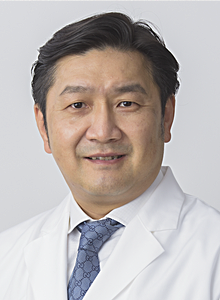
| 専門分野 | 上部消化管外科(食道・胃) |
|---|---|
| 特に専門としている分野 | 食道がん・胃がんの鏡視下手術、ロボット支援下手術、消化器がん化学療法 |
| 学会専門医・認定医 | 日本外科学会専門医・指導医 日本消化器外科学会専門医・指導医 日本内視鏡外科学会技術認定医(胃) ロボット支援下手術(胃)推奨プロクター ダビンチサージカルシステム術者資格認定 日本消化器内視鏡学会専門医・指導医 日本消化器病学会専門医・指導医 日本食道学会食道科認定医 日本臨床腫瘍学会暫定指導医 日本がん治療認定医機構がん治療認定医・暫定教育医 日本消化器がん外科治療認定医 日本腹部救急医学会認定医・暫定教育医 日本消化管学会認定医 日本胃癌学会代議員 日本腹部救急医学会評議員 日本内視鏡外科学会評議員 日本臨床外科学会評議員 博士(医学) 慶應義塾大学外科学教室客員准教授 東邦大学医学部客員講師 厚生労働省開催指針準拠 緩和ケア研修会修了 |
西山 亮(にしやま りょう)
東京医科大2005年卒
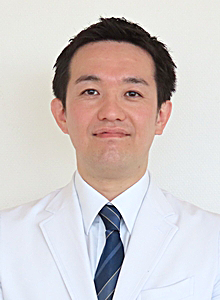
| 専門分野 | 一般・消化器外科 |
|---|---|
| 特に専門としている分野 | 肝・胆・膵疾患 |
| 学会専門医・認定医 | 日本外科学会外科専門医・指導医 日本消化器外科学会消化器外科専門医・指導医 日本肝胆膵外科学会高度技能専門医 日本内視鏡外科学会技術認定医 日本消化器病学会消化器病専門医 日本肝臓学会肝臓指導医 日本胆道学会認定指導医 日本膵臓学会認定指導医 日本がん治療認定医機構がん治療認定医 日本消化器外科学会消化器がん外科治療認定医 日本肝胆膵外科学会評議員 日本臨床外科学会評議員 ロボット支援下膵頭十二指腸切除プロクター ロボット支援下膵体尾部切除術プロクター ロボット支援下肝亜区域以上(外側区域以外)切除プロクター ロボット支援下総胆管拡張症手術(暫定)プロクター ロボット支援手術認定医(da Vinci Xi) 博士(医学) 厚生労働省開催指針準拠 緩和ケア研修会修了 神奈川県立保健福祉大学 非常勤講師 |
山田 暢(やまだ とおる)
慶應義塾大2008年卒
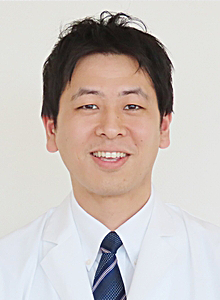
| 専門分野 | 一般・消化器外科 |
|---|---|
| 特に専門としている分野 | 下部消化管 |
| 学会専門医・認定医 | 日本外科学会専門医 日本消化器外科学会専門医・指導医 消化器がん外科治療認定医 日本大腸肛門病学会 大腸肛門病専門医・指導医 日本内視鏡外科学会技術認定医(大腸) ロボット支援手術認定医(da Vinci Xi) ロボット支援下手術(直腸、結腸)プロクター 厚生労働省開催指針準拠 緩和ケア研修会修了 |
森本 洋輔(もりもと ようすけ)
慶應義塾大2015年卒

| 専門分野 | 一般・消化器外科 |
|---|---|
| 特に専門としている分野 | 上部消化管外科(食道・胃) |
| 学会専門医・認定医 | 日本外科学会専門医 日本消化器外科学会専門医 消化器がん外科治療認定医 日本がん治療認定医機構がん治療認定医 日本食道学会食道外科専門医 医学博士 |

井上 芳正(いのうえ よしまさ)
慶應義塾大1996年卒
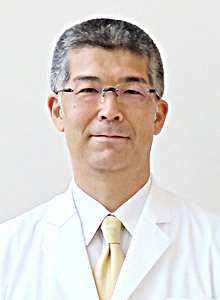
| 専門分野 | 呼吸器外科 |
|---|---|
| 特に専門としている分野 | 肺癌、自然気胸、縦隔腫瘍、膿胸などに対する胸腔鏡下手術、肺癌・縦隔腫瘍に対するロボット支援手術 |
| 学会専門医・認定医 | 呼吸器外科専門医 日本外科学会専門医・指導医 日本呼吸器外科学会評議員 日本呼吸器外科学会 胸腔鏡安全技術認定制度認定医 日本内視鏡外科学会技術認定医 ロボット支援手術認定医(da Vinci Xi) 日本呼吸器外科学会認定ロボット支援手術プロクター(手術指導医) 日本ロボット外科学会専門医(国内A級) 日本呼吸器内視鏡学会専門医・指導医・評議員 日本内視鏡外科学会評議員 日本がん治療認定医機構認定医 厚生労働省開催指針準拠 緩和ケア研修会修了 臨床研修指導医 博士(医学) 慶應義塾大学医学部講師(非常勤) |
村岡 祐二(むらおか ゆうじ)
信州大2015年卒

| 専門分野 | 呼吸器外科 |
|---|---|
| 特に専門としている分野 | 肺癌、自然気胸、縦隔腫瘍、膿胸などに対する胸腔鏡下手術 |
| 学会専門医・認定医 | 日本呼吸器外科学会 呼吸器外科専門医 日本外科学会 外科専門医 日本がん治療認定医機構認定医 ロボット支援手術認定医(da Vinci Xi) |

| 月曜日 | 火曜日 | 水曜日 | 木曜日 | 金曜日 | ||
|---|---|---|---|---|---|---|
| 午前 | 泌尿器科 | 荒井将至 (前立腺) |
三條丹星 (前立腺) |
石田勝 (前立腺・腎臓・膀胱・腎盂形成) |
小森貴大 | 案納忠譜 (前立腺) |
| 午後 | 消化器科 | 江川智久 | 山田暢 | 西山亮 | 森本洋輔 | |
| 婦人科 | 吉田卓功 | 田口圭祐 | ||||
| 呼吸器外科 | 井上芳正 | |||||
・消化器科(月~木曜日) ①13:00 ②13:30
・婦人科(月・水曜日) ①13:00 ②13:30
・呼吸器外科(水曜日) 13:00 のみ

医療機関より下記までお電話またはwebでご予約ください。紹介状の事前郵送は不要です。

12番受付に「ロボット手術外来の初診」である旨をお声かけください。
※予約時間に遅れた場合には、お待たせする事もございます。ご了承ください。
 よくある質問
よくある質問
ロボット支援手術は誰でも受けられますか?
患者さんの状態やこれまでに受けた手術の履歴などによりロボット支援手術を受けられない場合があります。手術の可否は、担当医またはロボット手術センターが判断します。ご希望の患者さんはご相談ください。
ロボット支援手術はどんな病気が対象なの?
当センターで、健康保険で受けられるのは前立腺がん、腎細胞がん、胃がん、直腸がん、膵体尾部腫瘍、膵頭部腫瘍、膀胱がん、良性子宮疾患、子宮体がん、骨盤臓器脱、腎盂尿管移行部狭窄症、縦隔腫瘍(重症筋無力症の合併を含む)、肺がん、腎盂・尿管がん、肝臓がん、副腎腫瘍(副腎摘出術)、副腎腫瘍(副腎摘出術(褐色細胞腫))、大腸がん(直腸)、大腸がん(結腸)の手術です。今後、他の手術も実施していく予定です。
費用はどれくらいかかりますか?
患者さんの年齢により、負担割合が異なります。
例えば前立腺がんでは、70歳未満では約45万円、70歳以上では最高で約9.3万円です(入院の日数などにより変動します)。
高額療養費制度を利用すると所得に応じて実際の負担額は減額されます。
全国共通の制度のため、他の医療機関と負担額が大きく変わることはありません。
 ダビンチによる前立腺がん手術
ダビンチによる前立腺がん手術
(前立腺全摘出術7日の場合)
【70歳以上】
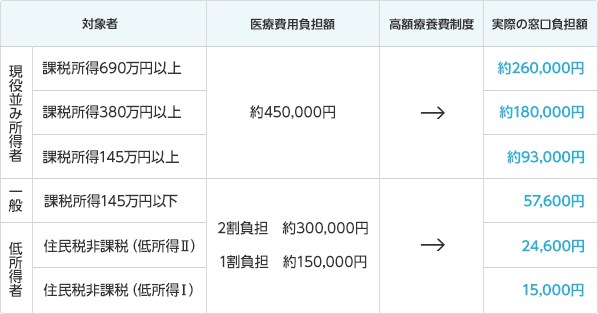
【70歳未満】
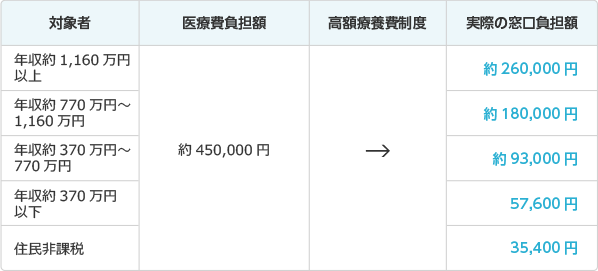
※1 低所得者Ⅱ
世帯員全員が①市町村民税非課税者、又は②生活保護法の要介護者であって、
自己負担限度額・食事標準負担額の減額により保護が必要でなくなる者
※2 低所得者Ⅰ
世帯員全員が「低所得者Ⅱ」に該当し、さらにその世帯所得が一定基準以下
保険適用外の手術の費用については、担当医に確認してください。
ロボット(ダビンチ)が手術をするのですか?
ロボットが自動で手術を行うことはありません。認定を受けた医師がロボットアームを操作して手術を行います。医師が操作しない限りは、ロボットのアームは動きません。
ロボット支援手術のメリットはなんですか?
- 人間の手による手術、腹腔鏡手術では不可能な動き、届かない場所での操作を行うことができます。
- ロボットのカメラが迫り、手術をする場所を大きく拡大して見ることができます。
- ロボットが手ブレを補正し、精密な手術操作をすることができます。これらの特徴により、開腹手術や腹腔鏡手術と比較して精度が高い手術を行うことができます。









